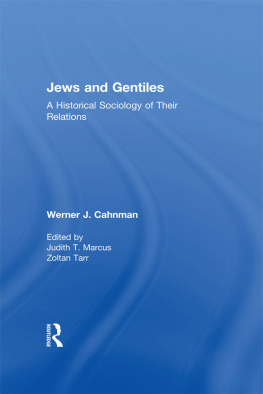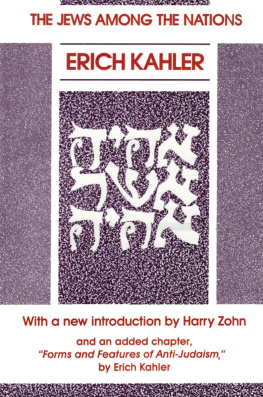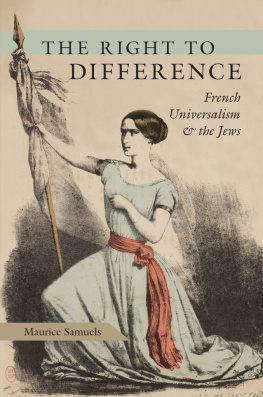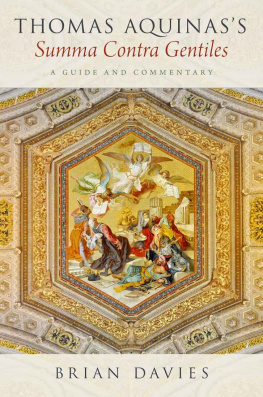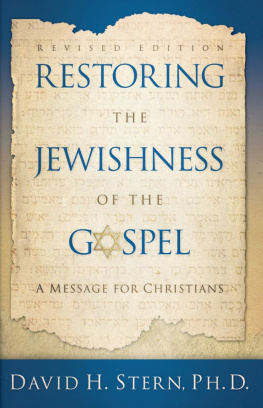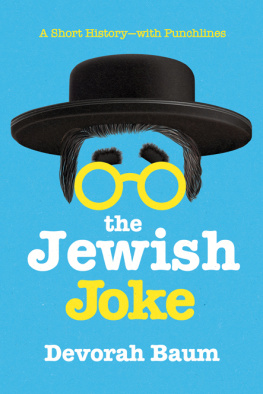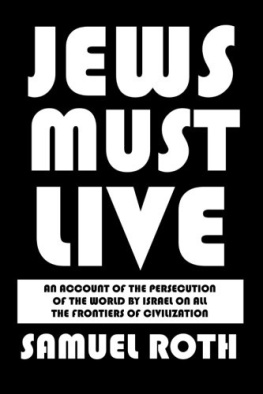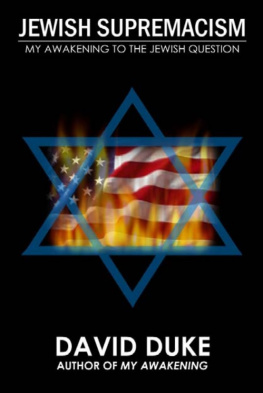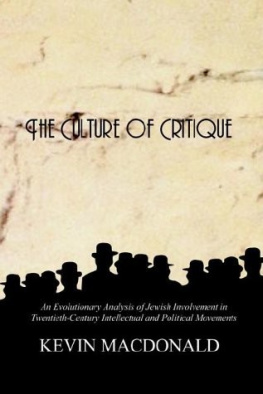
YOU GENTILES
MAURICE SAMUEL
By Maurice Samuel
Author of "The Outsider," "Whatever Gods."
Annotated for the modern reader by Edward Hurst
Ostara Publications
You Gentiles
By Maurice Samuel
First published 1924 in New York
This edition
Annotated for the modern reader by Edward Hurst
Ostara Publications
http://ostarapublications.com
Contents
The Question
I
THESE last ten years and more I have been asking myself, with increasing urgency, a number of questions:
Is there any special significance in the distinction I have so long cherishedthe distinction of "Jew-gentile"not to be found in the class of distinctions implied in "American-Foreigner" or "Englishman-Foreigner"? Is there, between us Jews and you gentiles, that is between the Jew on the one hand and the Englishman, the Frenchman, the American on the other hand, that which transcends all the differences which exist among yourselves, so that, in relation to us, you are gentiles first, and afterwards (and without particular relevance in this connection) Englishmen, Frenchmen, Americans?
Or is there nothing more implied in that distinction, Jew-gentile, than (in a general way) in the distinctions Jew-American, American-Englishman, Englishman-Frenchman?
In other words, are we Jews but part of the gentiles, Americans, Englishmen, Jews, Frenchmen, or is there a deeper cleavage between us? Is this Western world divided primarily into two partsyou gentiles; we Jews?
From the outset I shall be asked: "Even if you suspect the existence of such a primal cleavage, beyond the reach of ordinary national or racial classifications, what purpose can you have in urging it upon the attention of the world? Has it any practical application? Does it in any fashion clarify the status of the Jew, or give greater cogency to such claims of his as are still unsatisfied?"
This question will be asked of me by many Jewsbut in particular it will be asked with the utmost insistence by those Jews who have based our case for national rights, national equality, precisely on this assumptionthat we Jews are a people like all other peoples, similar in needs and impulses: that we are Jews, you are Englishmen, you are Italians, you are Americans; that we, the world's races or peoples, are all of us similar in our differences.
Leaving on one side those who deny the existence of any distinctions at all, those, that is, who say that the Jew is either a Frenchman, an American or an Englishman according to the place of his birth, I would answer: "For me the ordinary nationalist or racial classification has not sufficed."
If I have long pondered this question of Jew and gentile it is because I suspected from the first dawning of Jewish self-consciousness that Jew and gentile are two worlds, that between you gentiles and us Jews there lies an unbridgeable gulf. Side by side with this belief grew another, which is related to the practical aspect of the distinction.
I do not believe that, situated as we are in your midst, scattered among you from one end of the Western world to the other, we have the right to retain our identity if we are but another addition to the gentile peoples. (Nor, by the way, do I believe that we could have retained it so long had this been the case.) If we are but one more people added to the long roster of peoples, living and dead, we have no claim worth while, under these circumstances, to continuity of separate consciousness. Such a claim could never have arisen had we remained secure, segregated on our own soilit would have been our tacit birthright. But as it is, our existence is secured at an infinite expense of special effort on our part, and of peculiar discomfort to you. Wherever the Jew is found he is a problem, a source of unhappiness to himself and to those around him. Ever since he has been scattered in your midst he has had to maintain a continuous struggle for the conservation of his identity. Is it worthwhile, in the face of this double burden, our own and yours, to perpetuate what may be, after all, an addition of one unit to scores of similar units? Were these centuries of alternate torture and respite not a disproportionately high price for the right to increase by one page the already overburdened records of the nations?
Were it my belief, as it is, at least in expression, the belief of many fellow-Jews, that our right to exist is founded on our similarity to other peoples, that where American or Belgian or Italian has a right to homeland, culture, history, parliament, we Jews have the same right, for the same reasons, and for no other reasonswere this my belief, I could not find the heart to continue the struggle or to urge the struggle upon others. The effort is too severe; the price is too high: the guerdon is insignificant. Were we like other peoples we ought to have done what other peoples, under similar circumstances, would do: a people driven from its homeland, a people ground into dust and carried by winds of misfortune into every corner of the world, has no right to inflict its woes and longings on others. It should cease to exist, it should rid the world of its importunate presence.
Such would be my belief if I saw in ourselves only the replica, with the proper variations, of the rest of the world. But this is not my belief, for I see otherwise. Years of observation and thought have given increasing strength to the belief that we Jews stand apart from you gentiles, that a primal duality breaks the humanity I know into two distinct parts; that this duality is a fundamental, and that all differences among you gentiles are trivialities compared with that which divides all of you from us.
I am aware that this is a thesis which cannot be supported by diagrams, tables and logarithms. It cannot even be urged with the apparent half-compulsion of social and economic laws. The cogency of what I have to say does not depend on reference to obvious and ineluctable laws, natural processes acknowledged and accepted. I am also aware that the weight of what is called learned opinion will be thrown against me, that my contention will meet with the ridicule of facile common sense and of scholarship. Nevertheless I set it down clearly that in this Western world there are essentially two peoples as spiritual forces, only two human sections with essential meaningJew and gentile.
But at least what credentials have I to offersince the presentation of credentials must always precede the presentation of the thesis? What claim have I on the attention of the world? I can only answer that this book, being a serious book, must carry its own credentials, and does not attempt to borrow importance from outside sources. I offer myself only as a Jew who has lived, observed and thought: my experiences and contacts have been somewhat more varied than those of most men, but this has little to do with my views. The truth which is spread over the whole world is also contained in any part of it. The laws of gravitation are implied as completely in the falling of a pebble to earth as in the rush of the sun against the counter-rush of its companion stars. The law of Einstein works no less truly in the crawling of a snail than in the dizzy vibration of the fastest atomic sub-unit. These laws are more easily observed in the one set of cases than in the other: that is all.
If I have touched the truth it has been primarily through contact with lifeand I have regarded books as but a class of living things, to be observed and interpreted and placed in their setting. Life itself, observation of men and women, singly and in masses, a knowledge of their works (among which books are important), a feeling for their desires, perception of their intent in cities, laws, theaters, games, wars, all this has brought me to the conception I shall set forth.
Next page

